بِسْمِ ٱللَّهِ ٱلرَّحْمَـٰنِ ٱلرَّحِيمِ
Allah’s Name to commence with, the Most Gracious, the Most Merciful.
Discover the profound wisdom embedded in the foundational Islamic beliefs. This comprehensive guide explores key aspects of the Islamic faith, including the nature of Allah’s actions, the role of Prophets, the authenticity of divine scriptures, and the unparalleled preservation of the Holy Quran. Gain insights into how these beliefs shape the spiritual and moral fabric of a Muslim’s life.
The Wisdom Behind Allah’s Actions
Belief: Every act of Allah Almighty is filled with profound wisdom, whether we understand it or not. His actions are free from any need or purpose, as “purpose” implies a benefit returning to the doer, which does not apply to Him.
Likewise, His actions are not driven by any ultimate aim or goal, as these also suggest a need for benefit. Furthermore, His actions are neither dependent on causes nor bound by reasons.
The Divine Power Over Natural Laws
With His perfect wisdom, Allah Almighty has connected causes with effects in the world of means. For instance, eyes see, ears hear, fire burns, and water quenches thirst. However, if Allah wills, He can make the eyes hear, the ears see, water burn, and fire quench thirst.
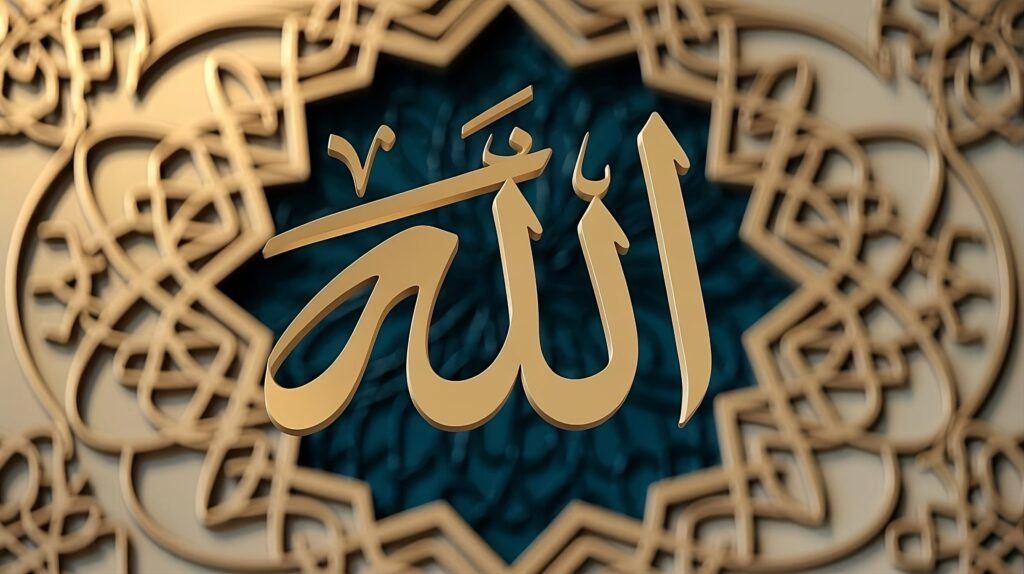
If he does not will, even a hundred eyes would fail to see a mountain in broad daylight, and countless fires could not leave a mark on a single straw.
The Story of Prophet Abraham and the Fire
Consider the intense fire into which the disbelievers cast Prophet Ibrahim/Abraham (peace be upon him). The fire was so fierce that no one could approach it; they had to use a catapult to throw him into it.
When he reached the vicinity of the fire, Angel Jibril (peace be upon him) appeared and asked, “O Ibrahim, do you have any need?” Prophet Ibrahim replied, “Yes, but not from you.” Jibril (peace be upon him) said, “Then ask the One from whom you have need.”
Prophet Ibrahim responded, “His knowledge of my condition is sufficient for me; I do not need to ask.” Allah Almighty then commanded the fire: يَـٰنَارُ كُونِى بَرْدًۭا وَسَلَـٰمًا عَلَىٰٓ إِبْرَٰهِيمَ (“O fire, be cool and peaceful for Abraham).1
Upon hearing this command, every fire on the face of the earth cooled down, fearing that the command might have been directed at it.
The fire became so cool that scholars say if Allah Almighty had not added the words “and peaceful” to the command — “O fire, be cool and peaceful for Ibrahim” — it would have become so cold that its chill would have caused harm.
Beliefs Related to Prophethood in Islam
For a Muslim, it is as important to know the essence and attributes of Allah Almighty as it is to ensure one does not deny any essential truth or affirm anything impossible about Him, which could lead to disbelief.
Similarly, it is necessary to understand what is permissible, obligatory, and impossible for Prophets. Denying what is obligatory or affirming what is impossible for a Prophet can also result in disbelief. A person might unknowingly hold incorrect beliefs or say something improper, which could lead to spiritual ruin.
Belief: A Prophet (Nabi) is a human chosen by Allah Almighty to receive revelation for guiding people. The term “Messenger” (Rasul) applies not only to prophets but also to angels. As in the Holy Quran: وَلَقَدْ جَآءَتْ رُسُلُنَآ إِبْرَٰهِيمَ بِٱلْبُشْرَىٰ قَالُوا۟ سَلَـٰمًۭا (And Our angels indeed came to Ibrahim/Abraham with glad tidings, they said, Salaam)2
Belief: All Prophets were human and male. No jinn or woman has ever been a Prophet. As stated in the Holy Quran: وَمَآ أَرْسَلْنَا مِن قَبْلِكَ إِلَّا رِجَالًۭا نُّوحِىٓ إِلَيْهِم (And all the Messengers We sent before you were only men).3
Belief: Sending Prophets is not obligatory upon Allah Almighty. Out of His grace and mercy, He sent Prophets to guide human beings and other creatures.
Heavenly Books and Prophets
Belief: For someone to be a Prophet, it is necessary that they receive revelation, whether through an angel or directly from Allah Almighty.
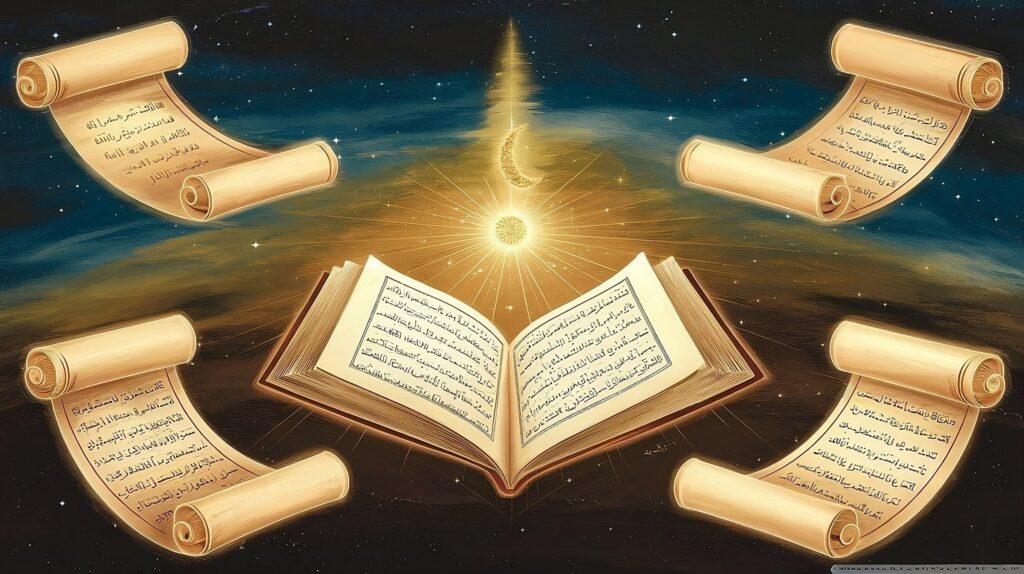
As stated in the Holy Quran: وَمَا كَانَ لِبَشَرٍ أَن يُكَلِّمَهُ ٱللَّهُ إِلَّا وَحْيًا أَوْ مِن وَرَآئِ حِجَابٍ أَوْ يُرْسِلَ رَسُولًۭا فَيُوحِىَ بِإِذْنِهِۦ مَا يَشَآءُ ۚ إِنَّهُۥ عَلِىٌّ حَكِيمٌۭ (And it is not appropriate for any human being that Allah should speak to him except as a revelation, or while the human being is on that side of the veil of Greatness (of Allah), or He sends an angel to reveal by His command whatever He wills. Indeed, He is All-Supreme, All-Wise).4
Allah sent scriptures and divine books to many Prophets. Among these, four are well-known:
- The Torah revealed to Prophet Musa (peace be upon him),
- The Psalms (Zabur) revealed to Prophet Dawood (peace be upon him),
- The Gospel (Injeel) revealed to Prophet Isa (peace be upon him), and
- The Holy Quran, the most superior of all, revealed to the most superior Prophet, the Radiant Prophet Muhammad (peace and blessings be upon him).
The superiority of some parts of Allah’s speech over others refers to the varying rewards for reciting specific scriptures. For instance, reciting verses of the Quran carries more rewards for us compared to other divine scriptures. However, this does not imply any inherent difference in the value or greatness of Allah’s speech itself, as Allah is One, and His speech is also one, perfect and indivisible. The distinction lies in the reward for recitation, not in the speech of Allah Almighty.
Beliefs Related to Earlier Heavenly Books
Belief: All divine books and scriptures are true and are the words of Allah. Believing in everything they originally contained is necessary. However, there is a key point: the responsibility for preserving the earlier scriptures was given to their respective communities.
Unfortunately, they failed in this duty, and Allah’s original words did not remain intact. In fact, some of their corrupt individuals altered these scriptures, adding or removing content according to their desires.
So, if any statement from these earlier scriptures is presented to us and, if it matches the Quran, we will confirm it as true. If it contradicts the Quran, we will firmly believe it is due to their alterations. If it neither agrees nor contradicts the Quran, we are instructed not to confirm or reject it but to say:
“We believe in Allah, His angels, His books, and His messengers.”
Allah Almighty Protector of The Holy Quran
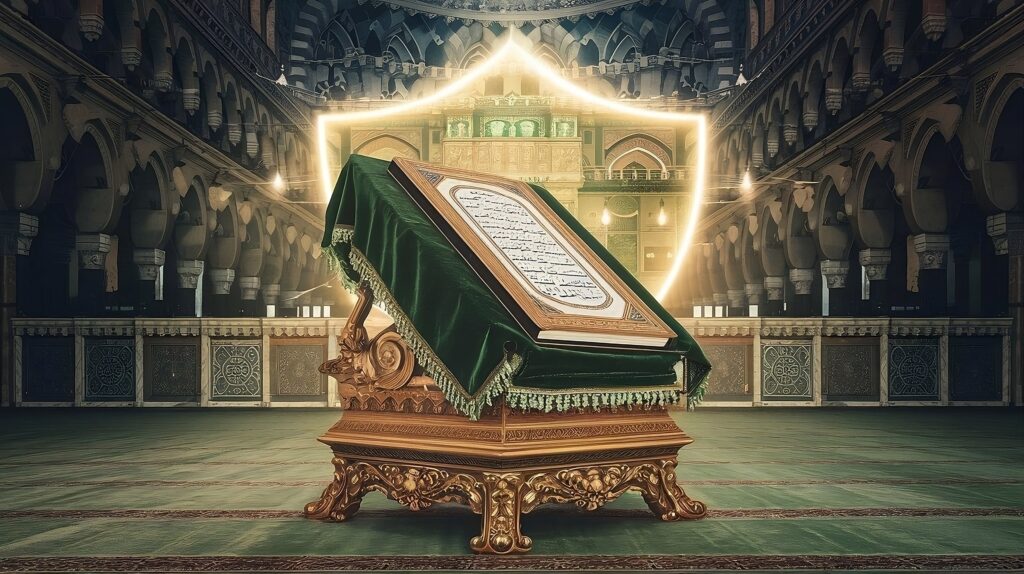
Since this religion is everlasting, Allah Almighty has taken it upon Himself to preserve the Holy Quran. As He says in the Quran:
إِنَّا نَحْنُ نَزَّلْنَا الذِّكْرَ وَإِنَّا لَهُۥ لَحَـٰفِظُونَ
“Indeed, it is We who sent down the Reminder (the Quran), and indeed, We will be its protector.” 5
Therefore, it is impossible for even a single letter or dot of the Quran to be altered. Even if the entire world were to unite to change it, they would not succeed.
Anyone who claims that any part of the Quran—be it a chapter, verse, or even a single letter—has been removed, added, or altered is undoubtedly a disbeliever (Kaafir). Such a claim directly denies the truth of the above mentioned verse and is open disbelief (Kufr).
FAQs
Frequently Asked Question (FAQs)
Why does Allah Almighty perform actions without any need or purpose?
Allah’s actions are based on profound wisdom and are free from any need or purpose, as the concept of “purpose” implies a benefit that reverts to the doer, which does not apply to Allah. His actions are independent of causes and reasons.
Can Allah Almighty alter natural laws?
Yes, Allah Almighty, in His wisdom, has connected causes with effects, like eyes seeing and fire burning. However, if He wills, He can make the eyes hear, the ears see, fire quench thirst, or water burn. Nothing is beyond His power.
What lesson do we learn from the story of Prophet Ibrahim (peace be upon him) and the fire?
The story demonstrates Allah’s control over creation and natural elements. When the fire was commanded to become “cool and peaceful” for Prophet Ibrahim, it obeyed. This emphasizes reliance on Allah and trusting His wisdom in the face of trials.
Who is considered a Prophet (Nabi) in Islam?
A Prophet is a human chosen by Allah Almighty to receive revelation for guiding people. Revelations may come through an angel or directly from Allah.
Were all Prophets human and male?
Yes, according to Islamic belief, all Prophets were human and male. No jinn or woman has ever been a Prophet.
Is sending Prophets obligatory upon Allah?
No, sending Prophets is not obligatory upon Allah. It is out of His grace and mercy that He sent Prophets to guide human beings and other creatures.
What are the well-known divine books revealed to Prophets?
The four well-known divine books are:
1. The Torah (Tawrah) revealed to Prophet Musa (Moses).
2. The Psalms (Zabur) revealed to Prophet Dawood (David).
3. The Gospel (Injeel) revealed to Prophet Isa (Jesus).
4. The Holy Quran, revealed to Prophet Muhammad (peace and blessings be upon him).What is the status of someone who claims the Quran has been altered?
Anyone who claims that even a single letter of the Quran has been removed, added, or changed is a disbeliever (Kaafir) because such a claim denies the Quranic verse affirming its preservation.
How is the Holy Quran protected from alterations?
Allah Almighty Himself has taken the responsibility of preserving the Quran, as stated in the verse:
“Indeed, it is We who sent down the Reminder (the Quran), and indeed, We will be its protector.” (Surah Al-Hijr: 9)
This divine guarantee makes it impossible for any part of the Quran to be altered in any way.How should Muslims view the statements in earlier scriptures?
If a statement matches the Quran, it is accepted as true.
If it contradicts the Quran, it is considered an alteration.
If it neither matches nor contradicts, it should neither be confirmed nor rejected, but the Muslim should affirm faith in Allah, His angels, His books, and His messengers.Why were earlier divine scriptures altered?
The preservation of earlier scriptures was entrusted to their communities, but they failed in this duty. Some individuals altered the texts by adding or removing content according to their desires.
I’ve shared some key foundational beliefs in Islam, with more insights coming soon. Stay connected to deepen your understanding and strengthen your faith. Missed Foundational Islamic Beliefs: Part 3? Click here!
If you have any queries feel free to contact us. Connect through social media handles:

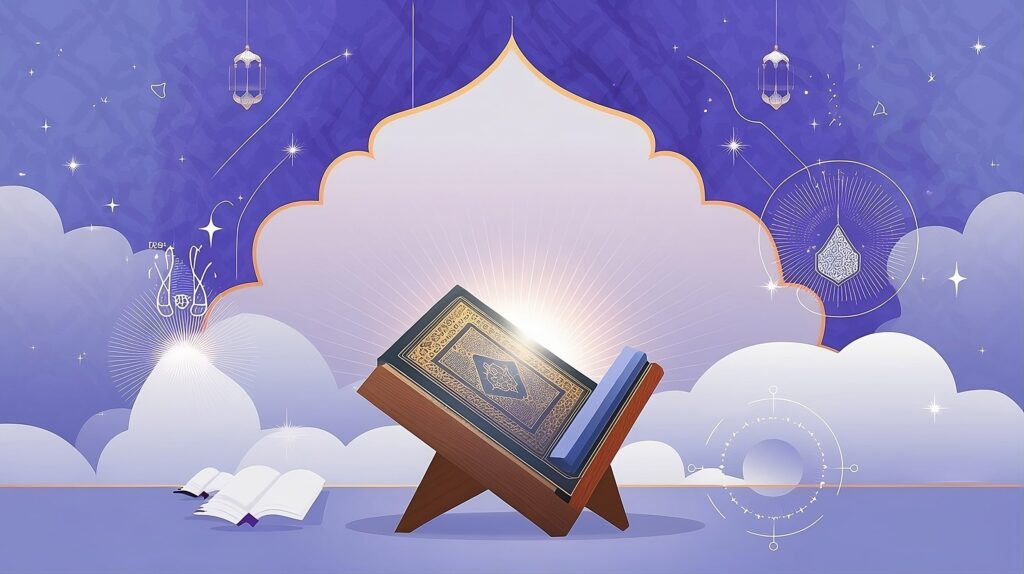

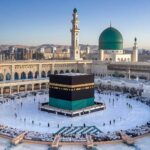
Pingback: Foundational Islamic Beliefs: Part 5 - ISLAMICAGE
This is exactly what I needed to read today.